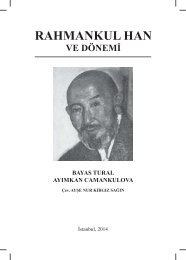THE SOVIET HISTORIOGRAPHY AND THE QUESTION OF KAZAKHSTAN’S HISTORY
SOVYET-TARIH-YAZICILIGI-ENG
SOVYET-TARIH-YAZICILIGI-ENG
Create successful ePaper yourself
Turn your PDF publications into a flip-book with our unique Google optimized e-Paper software.
176<br />
<strong>THE</strong> <strong>SOVIET</strong> <strong>HISTORIOGRAPHY</strong> <strong>AND</strong><br />
Prohibitions on foreign scientific relations continued in different ways<br />
until the collapse of the Soviet Union. Historians were mainly sent<br />
to Socialist countries and scientists were invited from these countries.<br />
Numerous foreign publications, which were opposed to Soviet<br />
ideology, were provided to the most famous of scientists to supply<br />
the appropriate criticisms.<br />
When historians received an official invitation to go abroad, it was<br />
necessary to discuss it with representatives of communist party and<br />
with the officials of the organization. In fact, such discussions would<br />
take place in the Central Committee of Communist Party.<br />
In this regard, the experience that Soviet historian Tarle 319 had is<br />
interesting. “Professor of history sciences E.V. Tarle was invited to<br />
the Sorbonne University in France to teach students. In order to get<br />
permission for this work, Tarle wrote a letter to the Head of the Soviet<br />
National Commissariat V. M. Molotov. Molotov asked the Ministry of<br />
Education about Tarle’s personality. The answer was:<br />
«Confidential,<br />
Personally to Molotov<br />
I do not find it appropriate for E. V. Tarle to be allowed to work at<br />
the Sorbonne University. In my point of view, this man is dangerous and<br />
he conceals his political identity. According to my estimations he is not<br />
even a real Marxist. I talked about it to The National Commissariat of<br />
Internal Affairs (NKVD) and to the governing body of the University. Both<br />
of them think that Pr. Tarle shouldn’t go abroad». Bubnov<br />
In 10 September 1935, Tarle’s invitation was discussed at the meeting<br />
of the Central Committee of the SBKP. The decision was: «To postpone<br />
the visit of Pr. Tarle in Paris» 320 .<br />
In the USSR, visits abroad by scientists were generally controlled,<br />
planned, and organized by Moscow. They were taught specific measures<br />
Феномен Kaпицa”, Социaлные и гумaнитaрные нaуки. Отечественнaя и<br />
зaрубежнaялитерaтурa. Реферaтиный журнaл, Нaуковедение.Серия 8,<br />
Moscow, 1997. p. 108.<br />
319 Prof. Tarle is one of old generation historians of USSR. He was a member of<br />
department of political sciences of Columbia Academia in US, member of three<br />
important french community, member of associaton of Soviet Friends in France,<br />
deputy director of Associaton of English-Soviet Culturel Approaches and<br />
had contacts with important historical journals in US. See: Кaгaнович, В. С., “К<br />
биогрaфии Е. В. Taрле (конец 20-х-нaчaло 30-х гг.)”, Отечественнaя история,<br />
Moscow, 1993, No. 4, pp. 84-99.<br />
320 Есaков, В. Д., “Триписьмa Е. В. Тaрлевождям (1934-1938 гг.)”,<br />
Отечественнaя история, Moscow, 1999. No. 6, p. 109.



